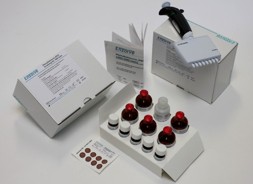Glucose-6P Dehydrogenase Deficiency (G6PD) is caused by a deficiency in the enzyme glucose-6P dehydrogenase needed to protect the organism and especially red blood cells against oxidative stresses. G6PD is included in newborn screening programmes in some countries, particularly in Asia and the Mediterranean, where it is the most common enzymopathy. The average incidence of G6PD in the world is approximately 1 in every 20,000 newborns, but newborn screening programmes in the Philippines and in Taiwan have reported much higher incidence figures of 1 in every 65. Untreated G6PD results in haemolytic anaemia, neonatal jaundice and neurological damage. Early detection and avoidance of certain medication, food containing fava beans, etc. can minimise most of the major complications connected with G6PD deficiency.
 Enzyme Deficiency Disorders
Enzyme Deficiency Disorders
G6PD Glucose-6P Dehydrogenase Deficiency
Website supported by







